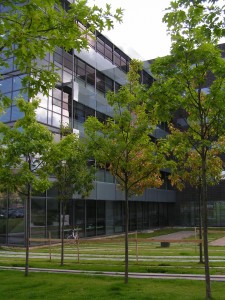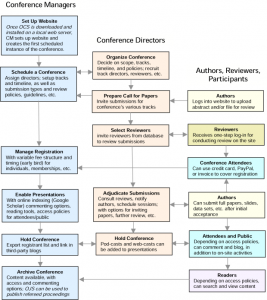Copenhagen Business School Library offers OCS as Conference Management System to Their Faculty: the Session Blog
Presenters: Kirsten Suhr Jacobsen, Helle Damgaard Andersen, Peder Lærke Nielsen
July 9th, 2009 at 3:00 pm
Helle Andersen has managed the Copenhagen Business School‘s webservices since 1999, including the main CBS page and related services such as the open conference system (OCS). Kirsten Jacobsen has managed several international conferences hosted by CBS. Together with Peder Nielsen, the library IT department leader, CBS offers conference management system OCS as part of the schools public web system.
Session Overview
The CBS has approximately 15,000 students and 1,000 staff making it one of the largest institutions in Northern Europe. The school understands that conferences are a possible forum to attract investment, scholarship and students. In turn, a professional conference system, may attract an increasing number of conferences to Denmark.
To help this initiative, the university has allocated 3 years of funding for a conference Secretariat at CBS. A large number of conference management systems (CMS) were considered, and OCS was eventually chosen for being open-source, flexible, exclusively web-based and with a large available community to provide technical support.
OCS is a comprehensive package that addresses the many facets of conference management, from online submissions of relevant content to management of all people involved (from registrants to presenters and organizers). OCS even facilitates development of conference webservices and online discussion forums. In fact, the PKP Scholarly Publishing Conference 2009, was managed using OCS. The system’s main strengthes lies in its flexibility and detailed indexing capactiy, which allows for dealing with multiple conferences simultaneously. OCS 2.0 is originally based on open-source code developed for open journal systems, and the CBS group made several productive improvements through formatting modifications and software plug-ins.
Unfortunately, the CBS group has run into multiple difficulties overcoming template configuration problems (especially with navigation menus), and a large portion of time was spent discussing multiple suggestions for improvement to the core software. Majority of the CBS group’s concerns described issues surrounding formatting, style design, and the lack of descriptors from pull-down menus. Other issues raised included expansion of administrative modules, and further development of OCS documentation and tutorials. CBS has already started this process, and suggested that perhaps resources be pooled with the PKP support group and collaborative documents be published on wikipedia.
Peder Neilsen facetiously commented that it is a “Danish tradition of not talking about what is good, but what could be better.” Certainly the described OCS strengths lay not only in its cost (free), but also in the flexibility conferred by open-source code. Furthermore, OCS users may benefit from accessing not only the development team, but a support group comprising of an international community of fellow users. Certainly, this session highlighted the productive interplay between the open-source software developers (of whom Alec Smecher was present in the audience to represent) and the users. Continual feedback drives steady modifications to the original source-code, new plug-in creations and essentially product evolution.

